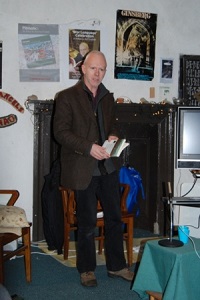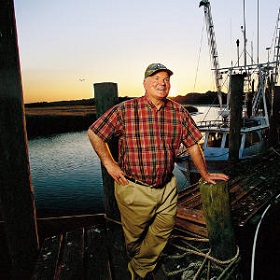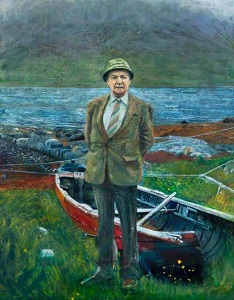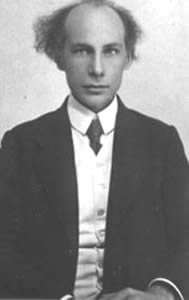De Ierse dichter Trevor Joyce werd geboren op 26 oktober 1947 in Dublin. Zie ook alle tags voor Trevor Joyce op dit blog en ook mijn blog van 26 oktober 2010.
Elegy Of The Shut Mirror
Inside rooms I’ve never seen
an old man beats himself
at chess, the moon recurs
as a white dove in a child’s dream,
a virgin leaves the glass
and, turning the light, retires;
as the mirror broods on itself.
Though the sun burns still through a vacant sky
frost thickens on the gates
and the moon grows up in the poplar’s shade.
A girl waits, lonely, on the bridge.
can I tell her of remote roads
where love, not knowing the shock of loss,
has atrophied, and no-one sees
how, at the desolate junctions
the monuments of the old dead bleed
with the green ichors of bronze;
or there are streets,
icy now where pools contract,
where I have heard the ringing footfalls of a child
who will remember evenings
charged with light, fever
of strange games played
in the falling of the oblique sun;
the private hurt of times and words
not uttered yet.
And shall I tell the destitute
how I have found their misery
like the wardrobe of a suicide, where I
the living, recognize
only the faded linens, the frayed cloth,
the torn letters in an inside pocket,
extracts from an unintelligible
and unfinished history;
or tell the old of aging
and the inevitable death.
with dusk the rain comes;
the ice loosens and the expanding locks
respond and open. such time impedes
the passage of another fall
that drags through lengthening nights
into the season of its bitter end.

De Amerikaanse schrijver Pat Conroy werd geboren op 26 oktober 1945 in Atlanta, Georgia. Zie ook alle tags voor Pat Conroy op dit blog en ook mijn blog van 26 oktober 2010.
Uit: The Prince of Tides
“But, as I watch this film, I often think that the boy did not know what he was really running toward, that it was not the end zone which awaited him. Somewhere in that ten second dash the running boy turned to metaphor and the older man could see it where the boy couldn not. He would be good at running, always good at it, and he would always run away from the things that hurt him, from the people who loved him, and from the friends empowered to save him. But where do we run when there are no crowds, no lights, no end zones? Where does a man run? the coach said, studying the films of himself as a boy. Where can a man run when he has lost the excuse of games? Where can a man run or where can he hide when he looks behind him and sees that he is only pursued by himself?”
(…)
“It was growing dark on this long southern evening, and suddenly, at the exact point her finger had indicated, the moon lifted a forehead of stunning gold above the horizon, lifted straight out of filigreed, light-intoxicated clouds that lay on the skyline in attendant veils.
Behind us, the sun was setting in a simultaneous congruent withdrawal and the river turned to flame in a quiet duel of gold….The new gold of moon astonishing and ascendant, he depleted gold of sunset extinguishing itself in the long westward slide, it was the old dance of days in the Carolina marshes, the breathtaking death of days before the eyes of children, until the sun vanished, its final signature a ribbon of bullion strung across the tops of water oaks.”

Pat Conroy (Atlanta, 26 oktober 1945)
De Duitse schrijver Ulrich Plenzdorf werd geboren op 26 oktober 1934 in Berlijn.Zie ook alle tags voor Ulrich Plenzdorf op dit blog en ook mijn blog van 26 oktober 2010.
Uit: Die neuen Leiden des jungen W.
„Wenn Sie mich fragen – Ed ging weg, weil er Maler werden wollte. Das war der Grund. Mist war bloß, daß sie ihn an der Kunsthochschule ablehnten in Berlin.«
»Warum?«
»Ed sagte: Unbegabt. Phantasielos. Er war ziemlich sauer.«
War ich! Aber Fakt war, daß meine gesammelten Werke nicht die Bohne was taugten.
Weshalb malten wir denn die ganze Zeit abstrakt? – Weil ich Idiot nie im Leben was
Echtes malen konnte, daß man es wiedererkannt hätte, einen ollen Hund oder was. Ich glaube, das mit der ganzen Malerei war eine echte Idiotie von mir. Trotzdem war die
Szene an sich nicht schlecht, wie ich da in diese Hochschule klotzte und gleich rein in das Zimmer von diesem Professor und wie ich ihm meine gesammelten Werke knallhart auf den Tisch blätterte.
Er fragte erst mal: Wie lange machen Sie das schon?
Ich: Weiß nicht! Schon lange. Ich sah ihn nicht mal an dabei. Er: Haben Sie einen Beruf? Ich: Nicht daß ich wüßte. Wozu auch? Mindestens da hätte er mich rausschmeißen müssen! Aber der Mann war hart. Er blieb bei der Stange!
Er: Hat das irgendeine Ordnung? Was ist das letzte, was das erste?
Er meinte meine Ausstellung auf seinem Tisch. Ich: Die frühen Sachen liegen links.
Die frühen Sachen! Leute! Das hatte ich gut drauf. Das war ein Tiefschlag. Er: Wie alt sind Sie? Der Kerl war wirklich hart! Ich nuschelte: Neunzehn! Ich weiß nicht, ob er mir das glaubte. Er: Phantasie haben Sie. Das ist keine Frage, überhaupt keine, und zeichnen können Sie auch.
Wenn Sie einen Beruf hätten, würde ich sagen: technischer Zeichner.
Ich fing an, meine Blätter einzupacken.“

Scene uit een opvoering in Aschaffenburg, 2011
De Schotse dichter Sorley MacLean (Schots Gaelic: Somhairle MacGill-Eain) werd geboren op 26 oktober 1911 Osgaig op het eiland Raasay.Zie ook alle tags voor Sorley MacLean op dit blog en ook mijn blog van 26 oktober 2010.
Hallaig
Time, the deer, is in Hallaig Wood
There’s a board nailed across the window
I looked through to see the west
And my love is a birch forever
By Hallaig Stream, at her tryst
Between Inver and Milk Hollow,
somewhere around Baile-chuirn,
A flickering birch, a hazel,
A trim, straight sapling rowan.
In Screapadal, where my people
Hail from, the seed and breed
Of Hector Mor and Norman
By the banks of the stream are a wood.
To-night the pine-cocks crowing
On Cnoc an Ra, there above,
And the trees standing tall in moonlight –
They are not the wood I love.
I will wait for the birches to move,
The wood to come up past the cairn
Until it has veiled the mountain
Down from Beinn na Lice in shade.
If it doesn’t, I’ll go to Hallaig,
To the sabbath of the dead,
Down to where each departed
Generation has gathered.
Hallaig is where they survive,
All the MacLeans and MacLeads
Who were there in the time of Mac Gille Chaluim:
The dead have been seen alive,
The men at their length on the grass
At the gable of every house,
The girls a wood of birch trees
Standing tall, with their heads bowed.
Between The Leac and Fearns
The road is plush with moss
And the girls in a noiseless procession
Going to Clachan as always
And coming boack from Clachan
And Suisnish, their land of the living,
Still lightsome and unheartbroken,
Their stories only beginning.
From Fearns Burn to the raised beach
Showing clear in the shrouded hills
There are only girls congregating,
Endlessly walking along
Back through the gloaming to Hallaig
Through the vivid speechless air,
Pouring down the steep slopes,
Their laughter misting my ear
And their beauty a glaze on my heart.
Then as the kyles go dim
And the sun sets behind Dun Cana
Love’s loaded gun will take aim.
It will bring down the lightheaded deer
As he sniffs the grass round the wallsteads
And his eye will freeze: while I live,
His blood won’t be traced in the woods.
Vertaald door Seamus Heane

Portret door Peter Douglas Edwards, 1990
De Russische schrijver en theoreticus van het symbolisme Andrej Bely werd geboren op 26 oktober 1880 in Moskou. Zie ook alle tags voor Andrej Bely op dit blog en ook mijn blog van 26 oktober 2010.
Uit: Petersburg (Vertaald door Robert A. Maguire en John E. Malmstad)
“Why has Petersburg not been given the attention and respect it deserves in the English speaking literary world? A large part of the reason is surely historical. Petersburg was one of the victims of the Soviet devastation of Russian culture; in the land of Leningrad, Bely’s words died: “there is no Petersburg. It only appears to exist.” But neither did Bely’s book benefit from the aura of dissidence that made Solzenitsyn or Pasternak such celebrities. As Maguire and Malmstad say: “Those writers of real talent whom the Soviets have simply neglected tend to suffer the same fate here.”
But this isn’t the whole story. I’m pretty sure that at least part of the reason for Petersburg’s comparative neglect is more literary: Petersburg is not easily assimilable to the ‘great tradition’ of English literature. Bely’s book does different things, in different ways, from the novels we are used to reading and studying. In some ways, perhaps, Petersburg is just too strange for the Anglo-Saxon literary imagination to get much of a bearing on it.
The comparison may be invidious, but I’m going to run with it anyway. Compare Petersburg and Ulysses. The comparison is often made. Both novels give a starring role to their cities – which serve as prisms through which to view the spirit of a nation; both follow the peregrinations of two men – older and younger, practical and intellectual. Though Petersburg doesn’t have Ulysses’ restricted time-scale, it very nearly does: once the assassins’ bomb starts ticking, we know that the story will reach its climax within twenty four hours. (Has anyone thought of pitching Ulysses to the makers of 24?). Both books are packed with the minutiae of everyday life; both use old newspapers to provide the detail of their characters’ habitats; and both are, of course, extraordinary masterpieces.”

